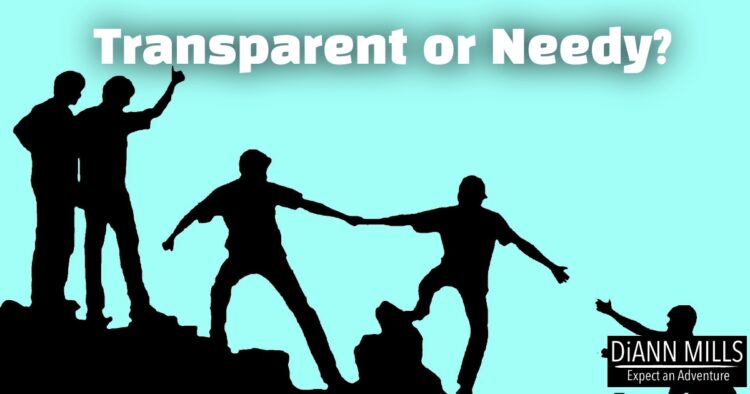By DiAnn Mills @DiAnnMills
We often hear the best way to communicate is to be transparent. Yet many people hesitate to use ihe ability for fear of being labeled needy. What is the difference between transparent and needy, and how do we apply transparency to our lives?
Transparent in written or oral communication means that we are allowing others to see through us for a distinct purpose. We are open, direct, honest, and sometimes blunt. The conversation isn’t about us but a means to help someone work through a problem or obtain insight. The transparent person is valued and respected because of their vulnerability offered in kindness. It’s an opportunity for us to invite others into a non-threatening environment.
Needy refers to a person who lacks the necessities of life, and the term is often used to describe the poor or deprived. Yet, people are often referred to as needy when they crave attention from others. It’s a form of selfishness that no one appreciates.
How far do we venture into transparency without appearing needy? That is the big question that often hits our radar. We want to help others who are experiencing a situation that is like one we’ve walked through. We want to offer suggestions and survival tools. But the conversation must be for their enrichment. Helping them rather than causing them to feel sorry for us.
Striking the right balance between transparency and avoiding the perception of neediness can be challenging. It’s important to remember that healthy relationships involve mutual support and understanding.
Not every person will be receptive of our attempts, and we may need to walk away if the person is uncomfortable. They may not be ready for help and have enlisted boundaries for us to follow. We must be sensitive to the other person’s needs and respect their acceptance or rejection.
The difference between transparency and neediness is a love for others. When we share our weaknesses and struggles, we are inviting others into a community where it’s safe and the person can find support, healing, and encouragement. In turn, they can help others.
We seek guidance from our Lord and listen for the voice of the Holy Spirit.
Ephesians 4:25 ESV: Therefore, having put away falsehood, let each one of you speak the truth with his neighbor, for we are members one of another.
A transparent person:
- Admits their faults
- Believes in sincerity
- Leads others down straight paths
- Listens with an open heart that doesn’t judge
- Lives an authentic life
- Models Jesus
- Practices accountability
- Prays for insight and wisdom
- Refuses to fall into the trap of needy
- Respects others
- Treasures humility
- Trusts God for all outcomes that are bathed in prayer
- Understands God reflects and encourages transparency
- Values self-awareness
- Walks in integrity
How do you feel about transparency? Have you ever been criticized or rejected for sharing your experiences to help others? How did you respond?


